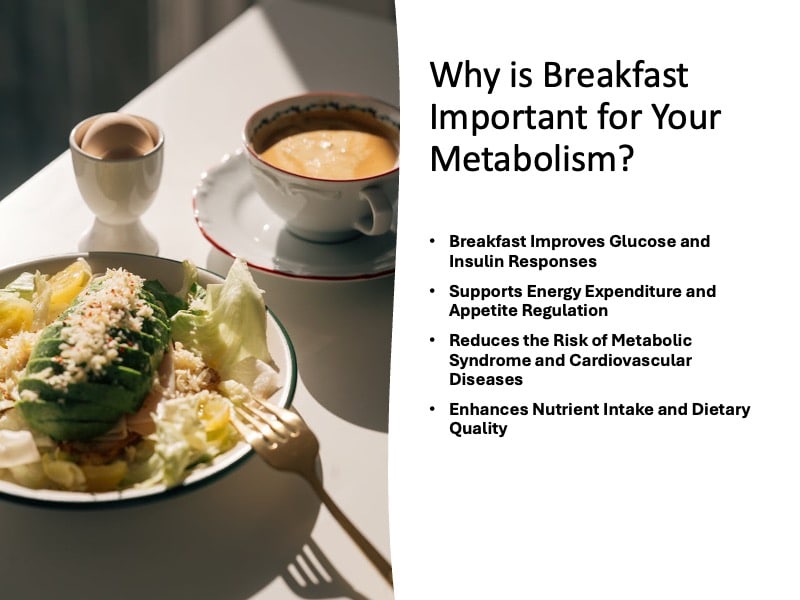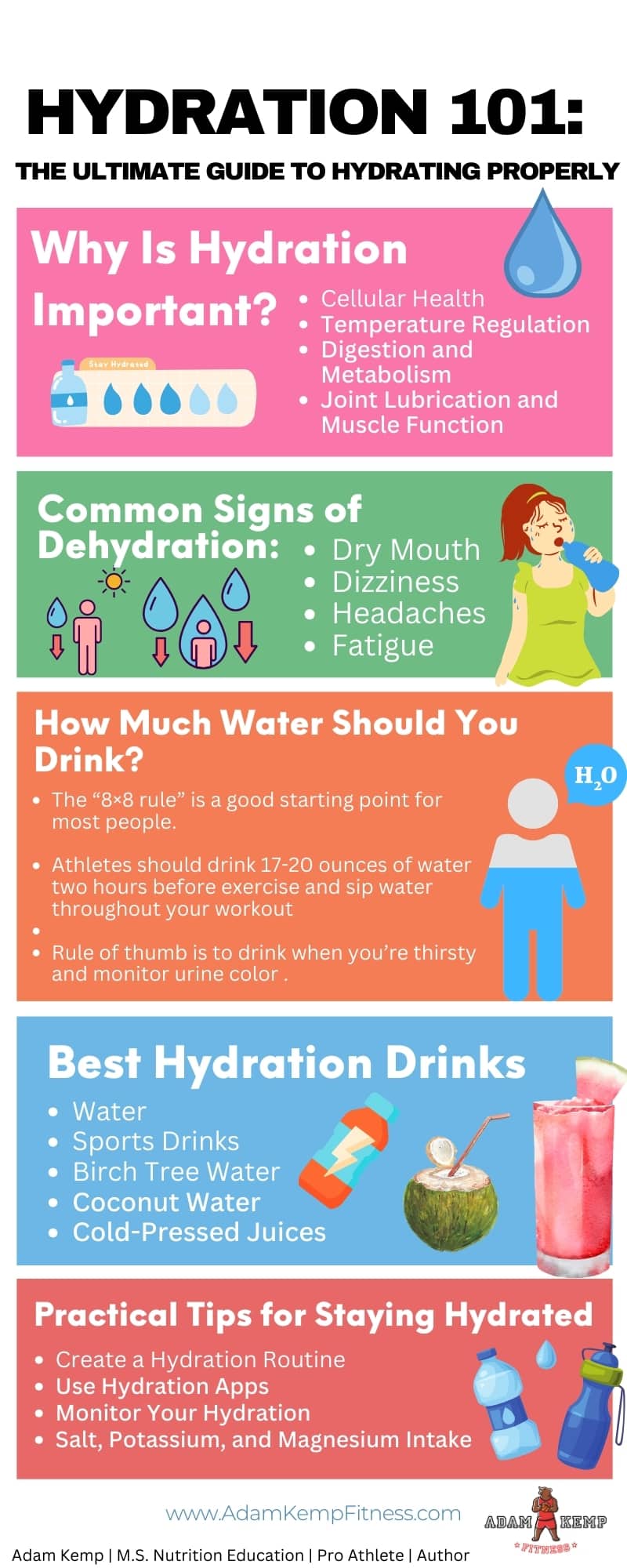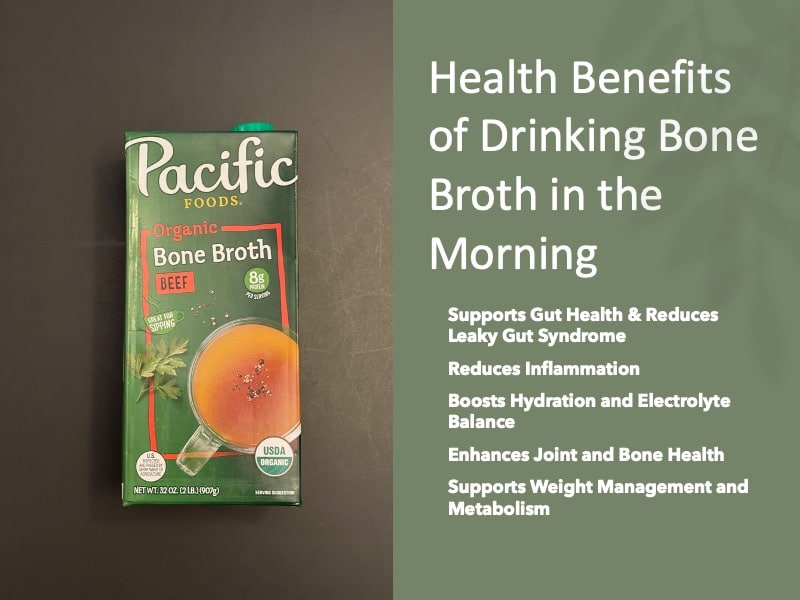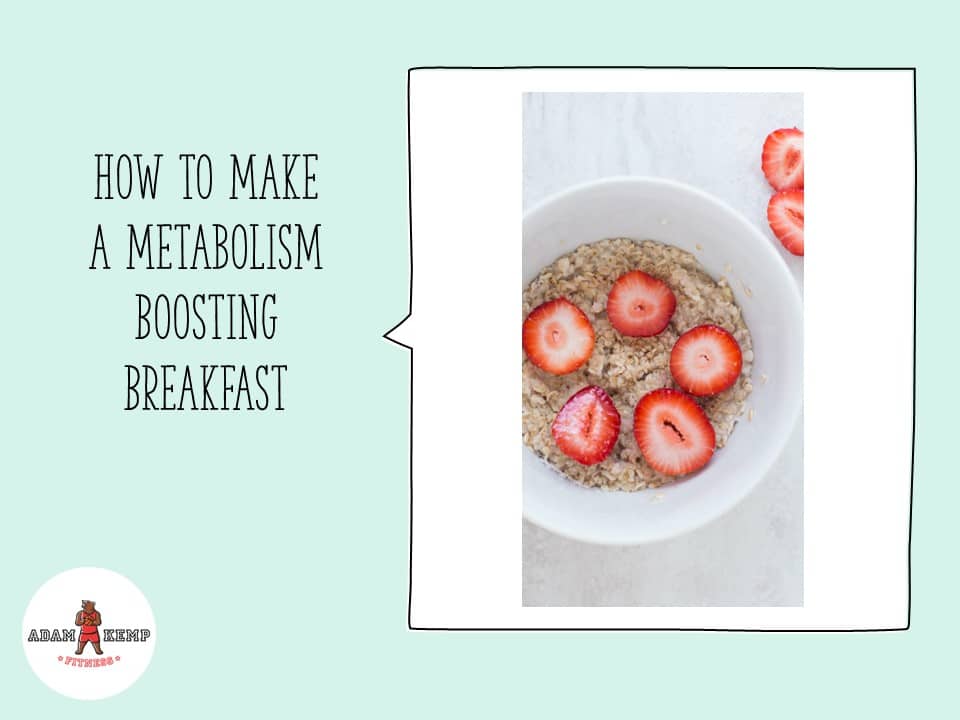How to Make a Metabolism Boosting Breakfast – Foods & Drinks
Consuming metabolism-boosting breakfast foods and drinks is an effective way to start your day and achieve your weight loss goals.
When you consume a healthy breakfast, you jump-start your metabolism and provide your body with the energy it needs to function throughout the day.
Skipping breakfast, on the other hand, can cause your metabolism to slow down, leading to a decrease in calorie burning.
Although there are benefits of intermittent fasting for weight loss, which usually requires skipping breakfast, people who are not doing intermittent fasting and trying to lose weight should consume a metabolism-boosting breakfast.
A metabolism-boosting breakfast is high in protein, fiber, and healthy fats, which help keep you feeling full and satisfied, reduce cravings, and prevent overeating throughout the day.
This article will help you find the best metabolism-boosting breakfast foods and drinks that I believe you should consume to ignite your metabolism, provide energy for your day, and help promote healthy weight loss.
What Is Your Metabolism?
Metabolism is the complex set of biochemical processes that convert food and drink into energy, allowing your body to perform essential functions such as breathing, circulation, digestion, and cell repair.
It involves two primary processes: catabolism (breaking down molecules for energy) and anabolism (building and repairing tissues).
Basal Metabolic Rate (BMR) – The Foundation of Energy Use
Your Basal Metabolic Rate (BMR) represents the number of calories your body needs to maintain basic functions at rest, such as maintaining body temperature, pumping blood, and supporting brain activity.
BMR accounts for about 60-75% of total daily energy expenditure (TDEE) and is influenced by factors such as age, muscle mass, genetics, and hormones.
Thermic Effect of Food (TEF) – The Energy Cost of Digestion
The Thermic Effect of Food (TEF) is the energy required to digest, absorb, and metabolize nutrients. Different macronutrients have varying TEF values:
- Protein: 20-30% (highest energy cost)
- Carbohydrates: 5-10%
- Fats: 0-5% (lowest energy cost)
Eating protein-rich meals increases TEF, helping boost overall energy expenditure.
A metabolism-boosting breakfast will generally include foods with a higher TEF.
Physical Activity and Non-Exercise Activity Thermogenesis (NEAT)
Beyond BMR, your metabolism is influenced by physical activity, including structured exercise and daily movements.
NEAT refers to non-exercise activities such as walking, fidgeting, or standing, which can contribute significantly to daily calorie burn.
Hormonal Regulation and Metabolism
Metabolism is largely regulated by hormones such as:
- Thyroid hormones (T3 & T4): Control metabolic rate.
- Insulin: Regulates blood sugar and fat storage.
- Cortisol: Affects metabolism and energy balance.
- Leptin & Ghrelin: Influence appetite and calorie intake.
Adaptive Thermogenesis – Metabolic Adjustments
The body can adjust metabolism in response to factors like calorie restriction, fasting, or extreme exercise.
Adaptive thermogenesis occurs when metabolism slows down to conserve energy, often making weight loss more difficult.
Why is Breakfast Important for Your Metabolism?

Breakfast plays a crucial role in regulating metabolism, impacting glucose control, insulin sensitivity, appetite regulation, and energy balance throughout the day.
Research consistently supports the benefits of consuming a nutrient-dense breakfast, particularly for metabolic and cardiovascular health.
Breakfast Improves Glucose and Insulin Responses
Skipping breakfast has been linked to impaired glucose metabolism and reduced insulin sensitivity, both of which increase the risk of type 2 diabetes mellitus (T2DM) (Maki et al., 2016).
Eating breakfast, especially one rich in whole grains, protein, and healthy fats, helps stabilize blood sugar levels, preventing insulin spikes and subsequent crashes.
This metabolic stability reduces cravings and overeating later in the day, supporting long-term weight management.
Supports Energy Expenditure and Appetite Regulation
Consuming breakfast enhances satiety and postprandial energy expenditure, which is essential for weight management (Gwin & Leidy, 2018).
High-protein breakfasts (≥30g per meal) increase thermogenesis—the body’s energy-burning process—while also regulating appetite hormones such as ghrelin and leptin.
A well-balanced breakfast helps individuals feel full for longer, reducing excessive calorie intake later in the day.
Reduces the Risk of Metabolic Syndrome and Cardiovascular Diseases
Regular breakfast consumption has been associated with a lower risk of metabolic syndrome, obesity, and cardiovascular diseases (Li et al., 2021).
People who eat breakfast more than three times per week have a significantly reduced risk of hypertension, strokes, and cardiovascular mortality.
The composition of breakfast also plays a role—meals high in fiber, healthy fats, and lean proteins provide cardiovascular benefits, while those high in refined carbohydrates and sugars may have the opposite effect.
Enhances Nutrient Intake and Dietary Quality
Breakfast is an opportunity to consume essential nutrients, including fiber, vitamins, and minerals.
Studies suggest that skipping breakfast can lead to poorer overall dietary habits and nutrient deficiencies.
Whole foods such as oats, eggs, nuts, seeds, and fruits contribute to metabolic wellness by optimizing gut health, inflammation control, and muscle function.
Types of Foods and Drinks That Boost Metabolism
Certain food and drink groups have a profound impact on metabolic function, primarily through their macronutrient composition and micronutrient profiles.
These foods enhance energy expenditure, improve digestion, and regulate hormones that control hunger and fat storage.
Protein-Rich Foods
Protein is essential for metabolism due to its high thermic effect of food (TEF), meaning the body burns more calories digesting and metabolizing protein compared to fats or carbohydrates.
Protein-rich foods increase satiety, reduce appetite, and promote muscle maintenance, which is crucial for sustaining a high metabolic rate.
Lean meats, fish, eggs, dairy products, legumes, and plant-based protein sources all support these metabolic benefits.
Whole Grains and Fiber-Rich Carbohydrates
Foods high in dietary fiber, such as whole grains, vegetables, and fruits, boost metabolism by promoting satiety and regulating blood sugar levels.
Fiber slows the absorption of sugar into the bloodstream, preventing insulin spikes and subsequent energy crashes.
Additionally, fiber-rich foods support gut health, which is increasingly recognized as a key player in metabolic regulation.
Whole grains like oats, quinoa, and brown rice are particularly effective for maintaining steady energy levels.
Healthy Fats
Healthy fats, particularly unsaturated fats, play a significant role in metabolic health.
They help improve insulin sensitivity, support hormone balance, and promote satiety.
Sources of healthy fats include avocados, olive oil, nuts, seeds, and fatty fish.
Incorporating these fats into the diet can enhance the body’s ability to burn fat as fuel and reduce inflammation, both of which are crucial for optimal metabolism.
Fermented Foods and Probiotics
Fermented foods and beverages, such as yogurt, kefir, kimchi, and kombucha, contain beneficial probiotics that promote a healthy gut microbiome.
A balanced gut microbiome is essential for efficient digestion, nutrient absorption, and energy regulation.
By supporting gut health, these foods help optimize metabolic processes and enhance the body’s ability to process nutrients.
Hydrating Drink
Adequate hydration is fundamental for metabolism.
Water is involved in nearly every biochemical process, including digestion and energy production.
Drinking sufficient water can temporarily boost metabolism by increasing energy expenditure, particularly when consumed cold, as the body uses energy to heat it to body temperature.
Herbal teas, like green tea, contain bioactive compounds such as catechins that have been shown to enhance fat oxidation and metabolic rate.

Foods Rich in Vitamins and Minerals
Micronutrients such as vitamins and minerals play crucial roles in metabolic pathways.
Foods rich in B vitamins (whole grains, leafy greens, and nuts) are particularly important for energy metabolism, as they aid in converting food into energy.
Magnesium, found in seeds, nuts, and leafy greens, supports over 300 enzymatic reactions, many of which are involved in metabolism.
Additionally, iron-rich foods (lean meats, legumes, and spinach) are essential for oxygen transport and energy production at the cellular level.
Best Metabolism-Boosting Breakfast Foods and Drinks
Consuming a metabolism-boosting breakfast is one of the easiest home remedies for weight loss.
I am confident the metabolism-boosting foods and drinks listed below will help make your weight loss journey easier.
Oats
Oats are a highly nutritious breakfast food that can help boost your metabolism and provide sustained energy throughout the day.
They are rich in complex carbohydrates, which are a great fuel source for your body, as well as a moderate amount of protein and healthy dietary fat.
One of the best aspects of oats is their high fiber content, which helps regulate blood sugar levels and prevent insulin spikes that can slow down your metabolism.
Additionally, oats are a low-glycemic-index food, which are digested slowly and provides a steady stream of energy without causing a sudden increase in blood sugar levels.
The best way incorporate oats into your breakfast routine is by preparing a bowl of oatmeal, which is the traditional way of consuming oats, or you can use whole oat powder to add to a smoothie for a quick and easy breakfast on the go.
Adding ingredients such as fruits, nuts, seeds, and a natural sweetener like raw honey or maple syrup can enhance your oatmeal’s flavor and nutritional value.
Blueberries
Blueberries are a superfood that can provide numerous health benefits due to their high nutrient content and low calorie count.
They are considered one of the most nutrient-dense berries and are readily available in most parts of the world.
Blueberries are an excellent source of vitamins and minerals, including vitamin K, vitamin C, and manganese.
They also contain 4 grams of fiber per cup, which can help stabilize blood sugar levels and support a healthy metabolism.
Additionally, blueberries are rich in antioxidants that help protect your body from free radicals, which can damage cells and contribute to aging and disease.
Research has shown that daily blueberry consumption may lower blood pressure and arterial stiffness, potentially due to increased nitric oxide production.
Lowering blood pressure is a significant health benefit of blueberries, as high blood pressure is a major risk factor for stroke, heart attack, and other deadly diseases.
Furthermore, research has shown that blueberries may improve selected features of metabolic syndrome and related cardiovascular risk factors.
Consuming a reasonable amount of blueberries, such as 75 grams, can provide statistically significant oxidative protection.
It’s important to note that if you have trouble with acidic foods, blueberries may interfere with an Alkaline Diet Plan or cause other problems associated with eating acidic foods.
However, for most people, consuming berries for breakfast is a healthy option and should not be avoided solely because they are acidic.
You can enjoy fresh blueberries on their own, add them to a smoothie or bowl of oatmeal, or try Kyani Sunrise, a supplement that contains wild Alaskan blueberries – a high-quality source of blueberries for your metabolism-boosting breakfast.
Adding blueberries to your breakfast routine can provide numerous health benefits and support a healthy metabolism.
Eggs
Eggs are a nutrient-dense food that can provide a great metabolism-boosting breakfast.
They are an excellent source of high-quality protein, healthy fats, and essential vitamins and minerals your body needs to function optimally.
Studies have shown that consuming eggs for breakfast can help reduce hunger and calorie intake throughout the day, leading to healthy weight loss.
In fact, one study published in the International Journal of Obesity found that overweight adults who ate eggs for breakfast consumed fewer calories at lunch and throughout the day compared to those who ate a bagel.
Eggs can be prepared in many different ways, including scrambled, poached, boiled, or baked.
You can also add vegetables like spinach, mushrooms, and peppers to your scrambled eggs to increase the nutrient content of your meal.
Avocados
Avocados are a versatile and delicious fruit that can be added to any breakfast to boost metabolism and provide essential nutrients.
In addition to being high in oleic acid, avocados are also a great source of fiber, which helps to regulate blood sugar levels and keep you feeling full throughout the morning.
One study published in the American Journal of Clinical Nutrition found that participants who ate a breakfast containing avocado experienced a reduction in hunger and an increase in satiety compared to those who ate a low-fat, high-carbohydrate breakfast.
The researchers attributed this effect to the high fiber content of avocados.
Avocados also contain a range of vitamins and minerals essential for overall health.
For example, they are an excellent source of vitamin K, which plays a critical role in blood clotting and bone health.
They are also high in vitamin C, which supports the immune system, and vitamin B6, which is important for brain function and the production of neurotransmitters.
In addition to these vitamins, avocados are rich in potassium, an essential mineral for heart health and regulating blood pressure.
They also contain folate, which is important for pregnant women and supports healthy brain function.
Finally, it is worth noting that avocados are also low in carbohydrates, making them a great choice for people following a low-carb or ketogenic diet.
With their delicious creamy texture and high nutrient content, it’s easy to see why avocados are such a popular choice for a metabolism-boosting breakfast!
Coffee
When it comes to breakfast, it’s not just about the food you eat but also the drinks you consume.
While water should be your primary choice throughout the day, drinking coffee can help you lose weight.
A study published in Obesity found that moderate coffee consumption can effectively reduce energy intake during the following meal and throughout the day for overweight or obese participants.
Furthermore, the caffeine in coffee will give you a burst of energy to be more active and get more things done!
If your goal is to increase your metabolism to lose weight, I believe the best coffee for weight loss is Four Sigmatic Happy Gut Coffee because of its additional probiotic and adaptogen content.
Last update on 2025-04-15 / This article includes affiliate links/Images via Amazon Product Advertising API. I may earn commissions on purchases made through these links.
Green Tea
There are other great metabolism-boosting drinks for breakfast, such as yerba mate tea and oolong tea, but it’s hard to beat drinking green tea for weight loss.
Green tea is probably the best weight loss tea and a great option for boosting your metabolism in the morning, as it contains EGCG, a natural antioxidant scientifically proven to help increase your metabolism and burn calories faster.
A study published in The American Journal of Clinical Nutrition found that green tea has thermogenic properties that go beyond its caffeine content, and it can help promote fat oxidation and increase sympathetic activation of thermogenesis.
In addition to its metabolism-boosting properties, green tea is also rich in antioxidants and can help reduce inflammation.
If you exercise in the morning, drinking green tea before working out is a great way to improve your workout performance and burn even more calories.
When choosing a green tea to drink for breakfast, it’s important to select high-quality options.
MatchaDNA is a great option, as it offers certified organic matcha green tea in convenient teabag form.
Drinking MatchaDNA can help you kick-start your metabolism and feel energized throughout the morning.
Last update on 2025-04-15 / This article includes affiliate links/Images via Amazon Product Advertising API. I may earn commissions on purchases made through these links.
Breakfast Smoothies
Smoothies are an excellent choice for a metabolism-boosting breakfast.
Metabolism-boosting breakfast smoothies only require a blender and a healthy-ingredients and are one of the quickest ways to make a metabolism-boosting breakfast.
If you don’t have a blender, the Nutribullet Pro is a mid-level high-quality blender option to consider.
To create a metabolism-boosting breakfast smoothie, add ingredients like nut butters, berries, plant-based milk, spinach, kale, and plant protein powder or superfood powders.
Although whey protein is commonly used, when comparing whey vs plant protein, I recommend using plant-based protein powder instead of whey for optimal health outcomes.
Superfoods for weight loss, such as Bloom Greens & Superfoods, can add protein, vitamins, minerals, and antioxidants to your smoothie.
Last update on 2025-04-15 / This article includes affiliate links/Images via Amazon Product Advertising API. I may earn commissions on purchases made through these links.
Using a smoothie as a breakfast option allows you to incorporate healthy ingredients you may not typically consume and mask their taste with other tastier ingredients.
This makes it a convenient and efficient way to get a vitamin and mineral-rich meal in just a few minutes.
Bone Broth

Bone broth is one of the best metabolism-boosting drinks you can include in your morning routine.
Packed with amino acids like glycine, proline, and glutamine, bone broth supports digestion, muscle recovery, and metabolic function.
These amino acids play a key role in reducing inflammation, improving gut health, and promoting efficient nutrient absorption—all of which contribute to a well-functioning metabolism.
Drinking bone broth in the morning can also help regulate blood sugar levels and provide a steady source of energy throughout the day.
The collagen content in bone broth is particularly beneficial for joint health and skin elasticity, making it a great addition for overall wellness.
Since bone broth is naturally low in calories but rich in protein and electrolytes, it helps keep you full while hydrating your body.
Whether sipped on its own or used as a base for soups and smoothies, bone broth is a simple yet powerful way to kick-start your metabolism every morning.
Final Thoughts: Making a Metabolism-Boosting Breakfast
Starting your day with a metabolism-boosting breakfast is crucial for maintaining a healthy weight and energy levels throughout the day.
To achieve this, you need to carefully select the foods and drinks you consume.
Protein-rich foods, such as eggs, Greek yogurt, and nuts, increase your metabolic rate by up to 30% since protein requires more energy to digest than carbohydrates or fats.
Fiber-rich foods, such as oatmeal and berries, can slow down carbohydrate digestion and help maintain a healthy weight.
Healthy fats like avocados and nuts can boost your metabolism by reducing inflammation and providing sustained energy.
Green tea and coffee are two drinks that can help boost your metabolism.
Green tea contains catechins, antioxidants that have been shown to increase metabolism and fat burning.
Coffee contains caffeine, which increases your metabolic rate and suppresses your appetite, leading to a reduction in calorie intake and weight loss.
Lastly, don’t be afraid to make breakfast your largest meal and eat smaller meals as the day progresses.
Incorporating these foods and drinks into your morning routine can jump-start your metabolism, provide energy for your day, and promote healthy weight loss.
By following these rules, you can get an aesthetic physique and stay healthy for the long haul.






